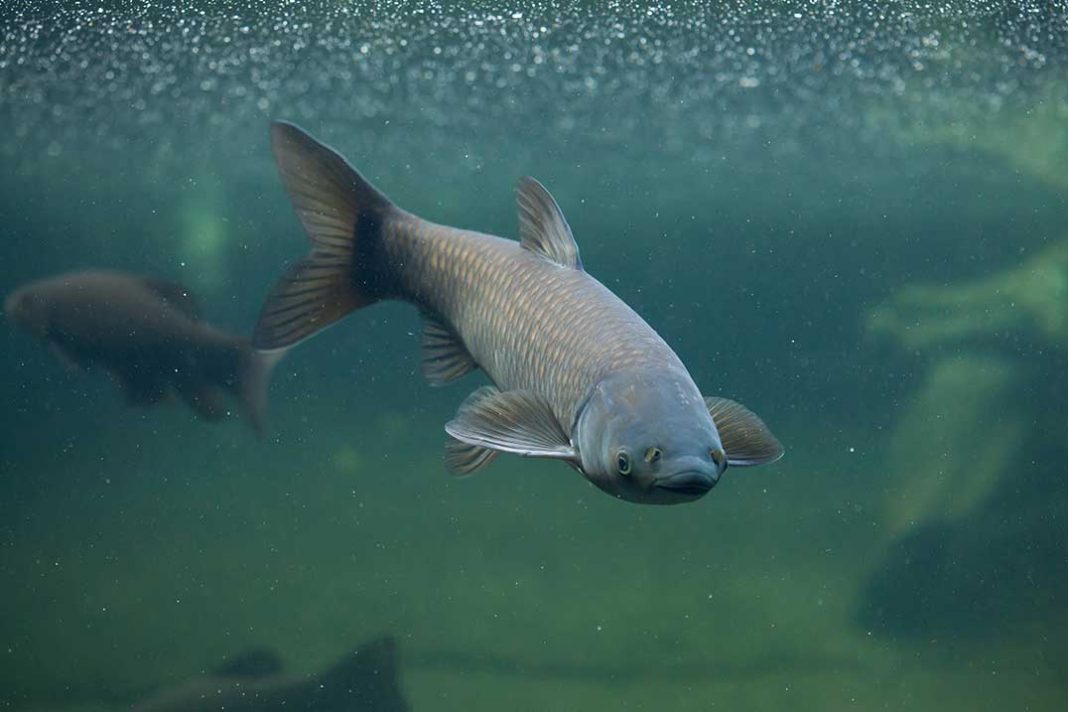GREAT LAKES—A significant step has been taken towards keeping Asian carp out of the Great Lakes, with the news that US federal officials have approved a plan to keep the invasive species of the Great Lakes, after studying the issue for five years.
“It has been much anticipated, the release of the study and the sign off on the plans,” stated Marc Gaden, communications director of the Great Lakes Fishery Commission (GLFC), when contacted by the Recorder Tuesday.
The Detroit News reported in its May 24 edition the recommended plan for the Brandon Road Lock and Dam near Joliet, Illinois following findings from the Great Lakes Mississippi River Inter-basin Study that showed the site could be a “one-way choke point” to stop the spread of the invasive species. Commanding general of the US Army Corps of Engineers (USACE), Lt. Gen Todd Semonite, approved the proposal, which calls for measures such as an engineered channel with an acoustic fish deterrent, air bubble curtain and electric barrier. It also calls for a flushing lock, boat ramps and other efforts to prevent Asian carp from moving from the Mississippi River basin to the Great Lakes basin through the Chicago Area Waterway System, said Army Corps officials in a statement.
“It is really good news that the Army Corps of Engineers has signed and has given the plan the seal of approval. Now we can move ahead with the effort to get this funded,” Mr. Gaden told the Recorder, pointing out that the recommendation from USACE will now be sent to the US Congress for authorization consideration. “It is nice to be able to get the approval (last week) so that we can now go to the powers to be for funding and to indicate why these controls need to be in place.”
“This plan needs to be done and carried out to keep Asian carp out of the Great Lakes through the sanitary shipping canal based in Chicago,” continued Mr. Gaden. He noted that if and when the plan and construction takes place it will provide another line of defence to keep Asian carp from advancing.
“We take this plan to Congress next,” said Mr. Gaden. “We know there are many in the House and the Senate who are supportive of the Brandon Road Lock project and want to see this project funded. I think the process for funding is going on as we speak. The time is now.”
Lawmakers in Congress, as well as Gov. Gretchen Whitmer and Illinois Gov. JB Pritzker, have raised concerns about the estimated cost of the Army Corps project, $778 million for construction, including contingencies and a non-federal sponsor’s share of $272 million. Additional operations and maintenance costs are estimated at $7.7 million annually, including a non-federal share of $1.5 million.
The state of Illinois, the project’s non-federal sponsor, would need to sign off on an agreement with the Army Corps for the pre-construction, engineering and design phase of the project, the Detroit News reported.
“The Great Lakes Fishery is worth $7 billion annually,” pointed out Mr. Gaden. “The presence and establishment of Asian carp would have severe negative impacts on the fishery and habitat; we’ve seen what they can do, as in the Mississippi River and bi-national risk assessment by Canada and the US. No lake would be spared if they get into the Great Lakes. There would be spawning habitat and food there if they reach the Great Lakes.”
“Prevention is the key,” stated Mr. Gaden, “because once they invade an area they are virtually impossible to eradicate.” He pointed out the plan’s approval comes after the US Fish and Wildlife Service announced earlier this month that the environmental DNA (eDNA) of three bighead carp and three silver carp had been found in Lake Calumet, south of Chicago near the Indiana border. It is unclear if any actual fish were found, officials monitoring the situation said. “There was positive identification of Asian carp DNA in Lake Calumet in Illinois, earlier this month, which is on the wrong side of the electrical barrier,” said Mr. Gaden. “There are a whole number of reasons they could get there; it could be a live fish, although I doubt it. Birds could have transported a dead carp, or a dead carp could have been released off a barge.”
Mr. Gaden said that if construction at the Brandon Road Lock takes place (in good time), “it would still be ahead of the Asian carp.”
US Senator Debbie Stabenow, who has sought funding for efforts to stop Asian carp from getting into the Great Lakes, supports the approval provided last week. She told the Detroit News, “the release of this final comprehensive plan is a critical step forward in our fight against Asian carp. The Army Corps has laid out a full suite of technologies that can be put in place at Brandon Road, both now and in the future, to stop Asian carp from wreaking havoc in the Great Lakes. Most importantly, this report gives Congress what it needs to authorize funding for the project and finally advance a much-needed, long-term solution.”





